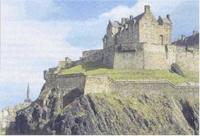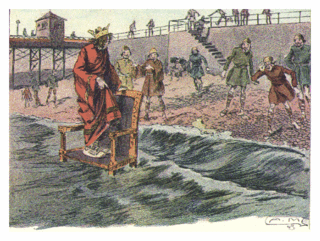The opposition between high and low gives rise to some of the most deeply embedded social metaphors. The rich and powerful are always "above," "on top," and "superior." The poor and powerless are the "lowly," "cast down," and "downtrodden."
This sense of power's transcendence is incarnated in the built environment, at a level far beneath ideology.
 The powerful build on the high ground. Perhaps originally the reasons for this were strategic, as a means to command the surrounding territory. But this social topography survives even in suburbia. Where I grew up, the most expensive and largest houses were found on the street named "Hilltop," which was the summit of the most gradual and gentle of slopes. The further down this almost imperceptible hill you went, the further "downmarket" the real estate.
The powerful build on the high ground. Perhaps originally the reasons for this were strategic, as a means to command the surrounding territory. But this social topography survives even in suburbia. Where I grew up, the most expensive and largest houses were found on the street named "Hilltop," which was the summit of the most gradual and gentle of slopes. The further down this almost imperceptible hill you went, the further "downmarket" the real estate.There's no great surprise, then, that one of the poorest cities in the USA should also be the most low-lying. And that within the city, it should be the poor at the city's geographical "bottom" who are more affected than the rich in the elevated suburbs.
The New York Times has maps of New Orleans that correlate race, household income, population density, and topography. (Click on "type of map" to switch between them.) As Richard Gwyn notes in the Toronto Star, "A map showing where black people live in the city agrees almost perfectly with a map showing where poor people live — and also agrees quite well with a map showing the lowest-lying neighbourhoods most affected by the flooding."
The powerful also build up. Tall buildings have defined and marked claims to spectacular transcendence from the Ptolemies to the medieval church, from the Rockefellers to Malaysian and Taiwanese assertions of their place in the First World elite. But 9/11 showed the vulnerabilities intrinsic to such excessive height. The elite have always been concerned about the possibilities that the underclass might "rise up" and "tear down" the walls that they have constructed.
Part of that fear comes from the awareness that theirs, the power of solidity and height, is a secondary power: that there is another power, fluid and deep, that is in fact primary.
 There has always been a particular rivalry between solidity and liquidity. Liquids level, either slowly, through erosion, or tumultuously and violently, as the dams break and the tidal wave comes through. They dissolve, make immanent, everything that the elite hold dear. The fable of Canute tells us that sovereignty can control everything but rising water. And the downfall of a capitalist enterprise is its liquidation.
There has always been a particular rivalry between solidity and liquidity. Liquids level, either slowly, through erosion, or tumultuously and violently, as the dams break and the tidal wave comes through. They dissolve, make immanent, everything that the elite hold dear. The fable of Canute tells us that sovereignty can control everything but rising water. And the downfall of a capitalist enterprise is its liquidation.No wonder that revolutions are often figured as floods. "Après nous, le déluge," as Madame Pompadour said.
And no wonder then that the flooding of New Orleans should have incited such panic about the threat of an unleashed African American underclass.
[Update: Lenin's Tomb links to an article from the Chicago Tribune that has the following revealing tidbit: "'It's the blacks,' whispered one white woman in the elevator. 'We always worried this would happen.'" The anxiety at the heart of power...]
No comments:
Post a Comment